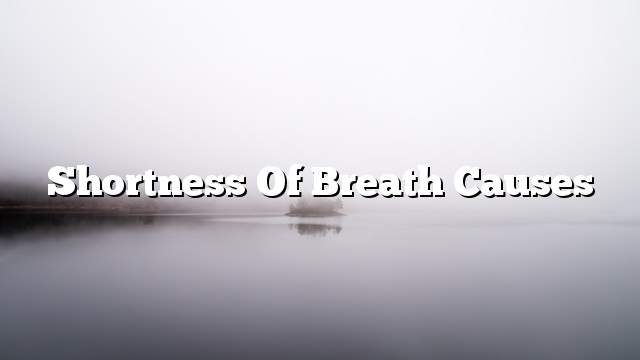hard breathing
Dyspnea is a feeling of tiredness and difficulty in breathing. Shortness of breath is often a symptom of a disease or health problem, often related to heart and lung disease. Shortness of breath is a sense of lack of air or oxygen, but remains a personal feeling may not be able to verify it in all cases, but can be inferred by an examination called the extent of saturation of oxygen, or through the observation of breathing and speed, and the duration of hardship suffered by A patient with shortness of breath, or by observing the discoloration of the patient’s color.
shortness of breath Causes
- Lung disease: The diseases that affect the lung lead to the inability to perform the appropriate blood oxygenation and then expel the carbon dioxide, which leads to increased breathing to compensate for the shortage, causing fatigue in the muscles of breathing and these diseases include: Inflammation Bronchitis, asthma, cystic fibrosis, pneumonia or pneumonia, as well as anthrax, lung cancer, pulmonary disease, pulmonary embolism and other diseases.
- Respiratory tract infections: These are some narrowing in the airways before reaching the lungs. They cause choking and shortness of breath. For example, what happens with the child when he is rattling because of the presence of a foreign object entering the bronchial tubes or episiotitis ), Pharyngitis, Stroma, Laryngitis, and pharyngeal or throat cancers.
- Cardiac diseases: Heart disease causes the heart to be unable to transfer blood to the lungs and then to the body at the appropriate speed and sufficient, causing a fluid congestion in the pre-ventricular left, and then exit these fluids through the blood vessels to the vesicle This can lead to obstruction of gas exchange, including: heart failure, heart valve failure, cardiomyopathy, and coronary heart disease.
- Neurodegenerative disorders: These are diseases that cause weakness in the nervous system or muscle, leading to weakness in the respiratory muscles and respiratory distress. A severe weakness in the respiratory muscles, if untreated, can lead to suffocation and death, as in tetanus Tetanus) or poliomyelitis. Examples of these diseases include:
- Multiple sclerosis.
- Myasthenia gravis.
- Amyotrophic lateral sclerosis.
- Chronic fatigue syndrome.
- The occurrence of disabilities in the diaphragm: diseases and conditions that hinder the diaphragm: Obesity and pregnancy.
Forms of shortness of breath
- Exertional dyspnea.
- Severe dyspnea at rest.
- Positivism (Orthodyspnea), a tight breathing during lying down, goes after sitting or standing.
- Functional (Functional dyspnea).
